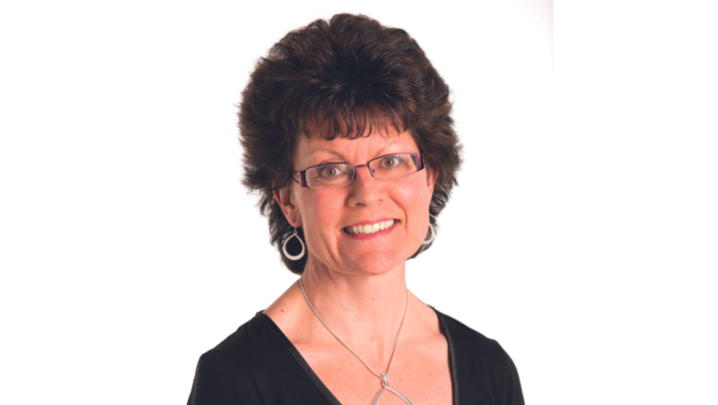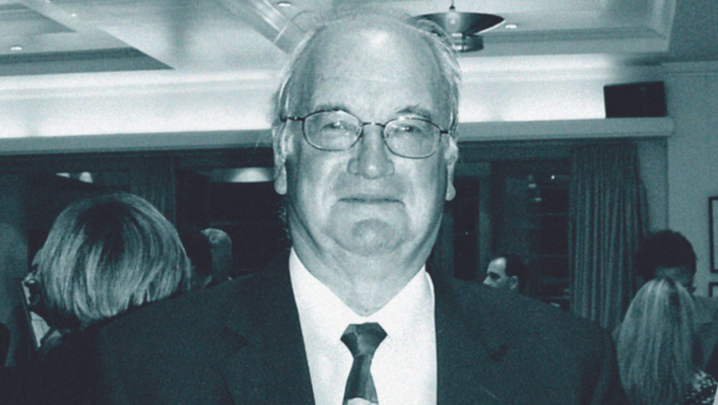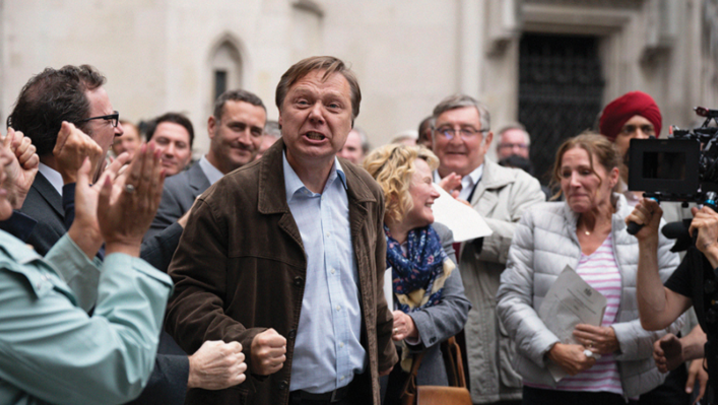Steve Clarke tucks in to a smorgasbord of ideas about how rewards for IP holders could be more fairly divided
Put a broadcaster, a writer of hit shows, a high-profile veteran agent and a successful producer on a panel to discuss the thorny question of rights ownership in a changing and consolidating content market, and a tense, sparky debate is assured.
So it was in a session entitled "Whose IP Is It Anyway?", ably chaired by Alex Graham, whose old company, Wall To Wall, was bought by Time Warner seven long years ago.
The core of the discussion inevitably revolved around who should get what and whether the spoils – aka "the pie" – were growing at a time when US giants, flush with cheap money, had bought up much of the British TV production business.
To add more spice to this most contentious of issues, the ante had recently been raised by Danny Cohen, the BBC's Director of Television, and David Abraham, Channel 4's CEO.
Both men suggested that the terms of trade – the rules that govern the relationship between the public service broadcasters and producers over rights retention – needed to be rethought (see below).
Many people maintain that it is these agreements which have enabled UK plc to become the dynamic global production hub that US investors want to grab a share of.
The discussion kicked off with Graham asking Liz Warner – whose own company, Betty, was bought by Discovery in 2011 in the pay-TV firm's first acquisition of an indie – if IP should be shared out more widely.
The margin in factual production is negligible... The money comes from foreign sales after the show is produced
In other words, should writers, directors and on-screen talent all get a piece of the action?
"It's not that they shouldn't, it's a question of how big is this pie," she replied. "People are deluded about how big the slice of the cake is to share around.
"I can't talk in terms of drama, as we're a factual producer [Betty's successes include Channel 4's The Undateables]... There isn't a large, large share, not lots to go round. The margin in factual production is negligible; without IP, the margin is tiny. We don't make a lot of money from production. The money comes from foreign sales after the show is produced."
Setting up a production company is not for the faint-hearted, she said; it isn't like running a coffee bar where a level of business is guaranteed.
Warner emphasised: "All the risk is taken by the individual. Why shouldn't there be some gain at the end?... People shouldn't be punished for success. The UK creative sector has been an amazing success story."
Graham then brought Channel 4's Director of Commercial Affairs, Martin Baker, into the fray. He asked him why talent shouldn't see more of the pie?
"They do... The point about net receipts is that they're net after those costs... Writers, talent, freelance directors already receive residuals," said Baker.
So, said Graham, turning to Bryan Elsley, the writer of Channel 4's Skins and Dates: it's not a very big pie and you're already getting a fair share. What's the problem?
"At the top end of the market there isn't a problem," acknowledged Elsley. "Agents have been very assiduous in the past 10 years at carving out percentages of profits.
"At the bottom end of the writing profession, however, it is very chancy and hard to make a living in a profession that requires an enormous degree of commitment."
It might be brutal, but is that not the nature of the market? countered Graham.
"That is right, but you can also argue that at the mid- to entry-level of writers, where there is a very high turnover on big, long-running shows, there is actually a skills gap.
"This emanates from the fact that people find it very hard to stay in the profession," said Elsley, who recently formed his own production company, Balloon Entertainment, with Harry Enfield (see below).
How do you solve that problem? "Ultimately, it is about paying writers a little bit more. This, of course, does speak to profit and share," said Elsley.
Next into the ring was Michael Foster, whose clients have included Chris Evans and Sacha Baron Cohen, and who plans to stand as an MP for Labour next May. He was not known as a shy and retiring agent, observed Graham. Do these writers just need better agents?
Foster agreed with Elsley. He said: "In America producers don't get back end... [In the UK] new writers are probably only going to get one or two jobs a year, so you've got to pay them really well.
"It's very easy to get a deal for a successful writer like Bryan, but for newcomers it is not so easy."
Graham wasn't finished. If production margins were tight and broadcasters were trying to claw in some of that back end, surely the money wasn't there?
"If the money is not there, where do you find the IP to produce?" answered the agent. "Unless you encourage people to come into the business... To begin with, you've got to pay for the IP. Broadcasters can't broadcast, producers can't produce, unless they've got content.
"Whether they invent the content themselves or commission it, you've got to pay for the right to be in the chain."
Warner pointed out that in recent years "wages have gone up quite dramatically". She insisted: "We're paying a lot more for entry-point researchers, assistant producers. We're all paying as much as we possibly can. The money is going out the door as fast as possible...
"Broadcasters want an increase in quality and better ideas, but they are not paying more for it.
"The only way we can cover our overheads and run stable businesses is to own our intellectual property."
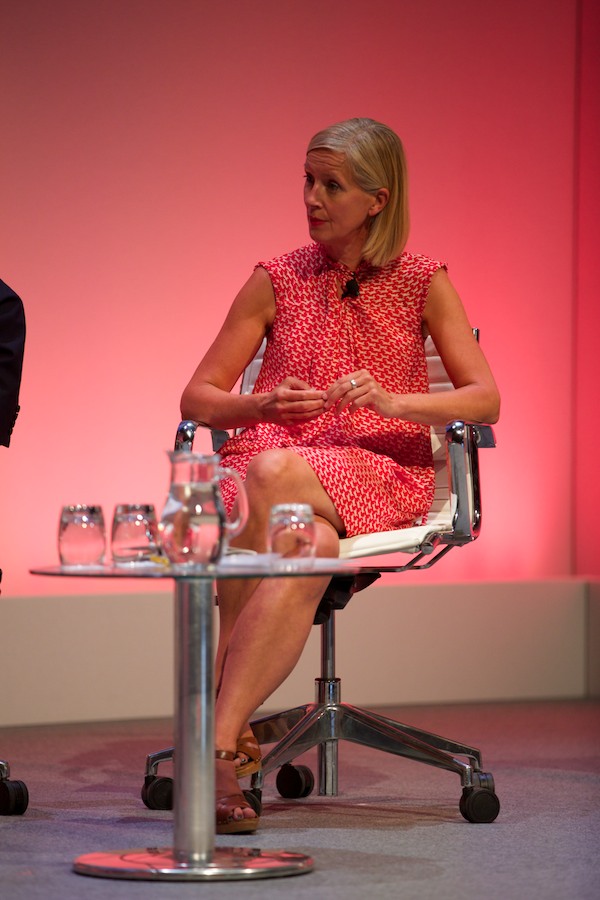 Liz Warner discusses how IP should be shared (Credit: Paul Hampartsoumian)
Liz Warner discusses how IP should be shared (Credit: Paul Hampartsoumian)
Zeroing in on the question of talent setting up their own production companies, Graham asked Warner for her view of this practice.
"We do co-produce with on-screen talent. Good luck to them if they want to set up their own production companies.
"Let them come up with the ideas, find the pitch and feel the fear like we do, because it's a terrifying thing to own your own production company."
She suggested that in some cases these "production companies" were not fully functioning programme-makers but vehicles "to hold their property and then we work with them and provide all the production".
Graham asked Foster if this was a clever way of talent getting a bigger slice of the pie. "Bryan protects his IP because it's his IP... Most talent that has a production company are at the high level," purred Foster, who once owned a company called The Rights House.
"All producers have a choice of who they want to work with. My best friend Liz can say that people have an unfair piece of the pie, but it cuts all ways – everything.
"The great thing about showbiz is that it is about collaboration and you don't have to work with anybody."
Calling for structures to protect entry-level writers, Foster then drew attention to what he claimed was the lousy remuneration received by directors working in British television.
"I've never understood why directors in TV – and I am not talking about factual, because it is a different kind of thing – get paid as little as they do," he observed.
"If you go on set and you're in a production that shoots for 40 days, you've got somebody in charge of a crew of 80 people, who's shooting and getting it all done.
"They're spending £60,000-£80,000 a day and they get paid most probably less than the cameraman.
"How many times do you look at something and say, 'That is so beautifully shot, cast and lit.' It's the producer and the director."
Baker suggested that the situation was more complex than Foster implied. "In the past couple of years all broadcasters, through Pact, have recognised that freelance directors have rights, and there is a collective way of responding to that," he said.
"The structures exist, whether or not you think the proportions are correct."
Foster pointed out that in the US television directors tend to get a percentage of the back end.
Graham highlighted the fact that every show was different. In some, the writer was at the heart of the process, while in others the acting talent drove the commercial market.
Did you end up with an endless spiral of demands, he worried, such that the pie was divvied up in so many pieces that the returns were not worthwhile?
Elsley's answer was worth listening to. "For quite a few decades there has been a centre line of arrangements," he said. "There was a mainstream way of making TV.
"Now, for the first time that I can remember, there is significant growth in the market. There is a significant international presence, both incoming and outgoing.
"I think that's why we're discussing this. The IP is subject to change and that centre line is gradually disappearing, especially with the new platforms and new ways of doing things, and with significant investment by US companies.
"You can argue that is a good thing because it means we will become more market-led.
"The problem with that is that the US market has a very firm centre line. It is not a free market.
"It is very, very prescriptive in how it operates. At the moment, a clash is going on in terms of how that is going to work and how IP is to be dealt with.
"In terms of cutting this cake, the cake is getting bigger for the first time that I can remember."
Michael Foster agreed. The other panellists remained silent. Graham had opened a can of worms. Expect this debate to continue in what used to be called smoke-filled rooms.
Session Seven, 'Whose IP Is It Anyway?', was produced by Stuart Cosgrove and chaired by Alex Graham, Director, Big Eck Consulting. The panellists were: Martin Baker, Director of Commercial Affairs, Channel 4; Bryan Elsley, Writer of Skins and Dates; Michael Foster, Agent; and Liz Warner, Chief Executive, Betty.
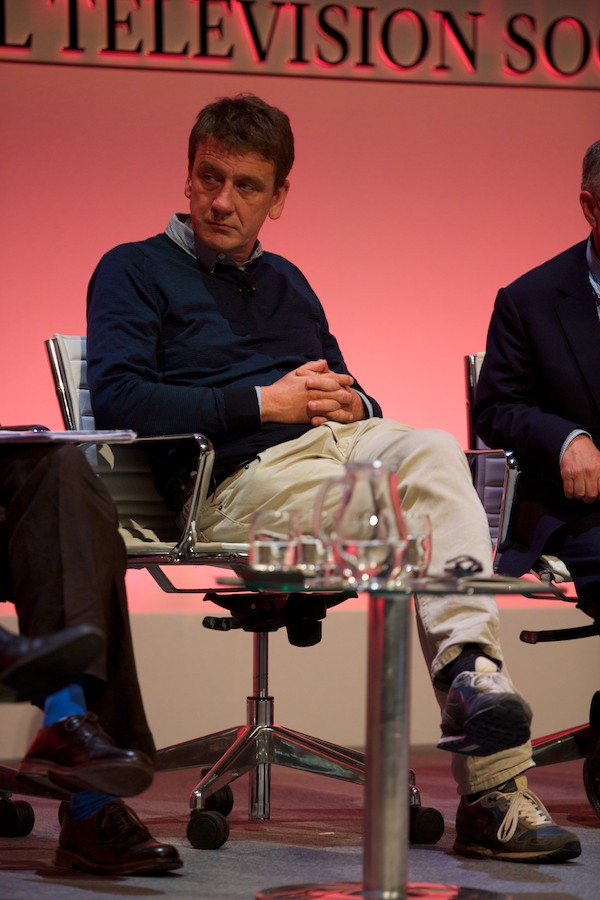 Bryan Elsley explains why he went into production (Credit: Paul Hampartsoumian)
Bryan Elsley explains why he went into production (Credit: Paul Hampartsoumian)
Why a writer went in to production
Q Alex Graham: Was it creative control that made you want to become a writer-producer or did you want a bigger slice of the pie?
A Bryan Elsley: To some extent, it was financial and, to some extent, it was to do with the ownership of the intellectual property that was created.
But much more, it was to do with being able to choose the people to work with and having the freedom to make those choices. Of course, you never have complete freedom: broadcasters need to have their say... I wanted more freedom of choice.
Q Alex Graham: Has setting up Balloon produced significant benefits for you?
A Bryan Elsley: I think it would be hard to find any managing director of any production company who could say 100% it's all a good thing, because it is incredibly stressful and difficult.
Sometimes you wonder why you do it and think it would be much easier to go and work for Andy Harries. But, in general terms, it is incredibly satisfying.
Question & answer
The terms of trade – overtaken by events?
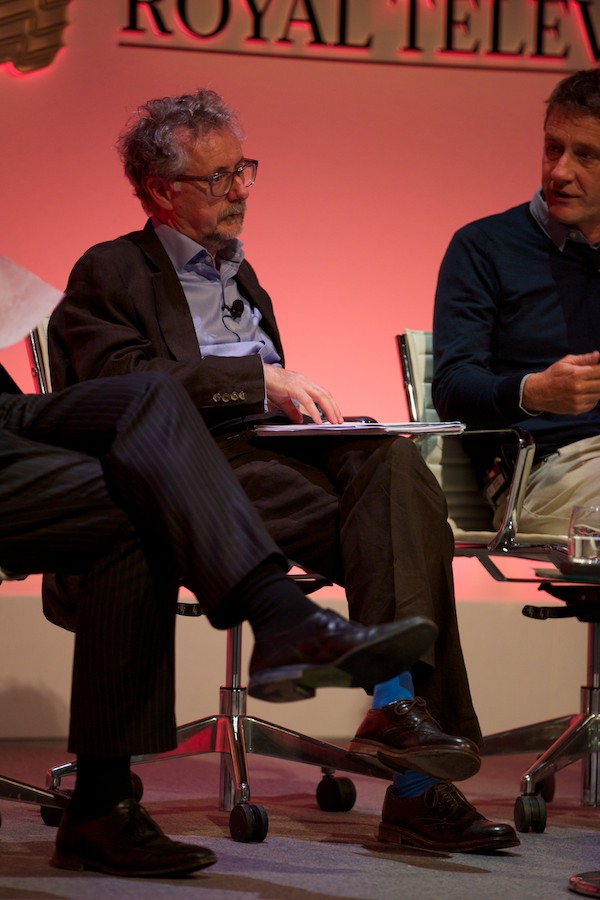 Martin Baker discusses the terms of trade (Credit: Paul Hampartsoumian)
Martin Baker discusses the terms of trade (Credit: Paul Hampartsoumian)
Q Alex Graham: The BBC's Danny Cohen thinks that the terms of trade should not be the same for a global studio as they are for a small independent company.
In his recent MacTaggart Lecture, David Abraham said that "smaller companies need a special level of support and protection when participating in a market characterised by big players".
How would Channel 4 like to see the system change?
A Martin Baker: It's been 12 years since the ITC ran its inquiry into the UK programme supply market and whether there should be intervention and, if so, in what form. David was saying it is time to ask the question again. Should [the terms of trade system] continue... and, if it does, what job should it now do looking forward?
And, specifically... [asking what role the system] has in sustaining public service broadcasting. Ofcom's duty is to defend and maintain PSB.
Q Alex Graham: What is wrong with the current terms of trade?
A Martin Baker: What is the definition of independent producers? A lot has changed in the shape of the market...
The distinction between our primary and secondary rights... In many ways, these things are blurred to the extent that you can't really tell the difference between them...
We think it is appropriate to ask the question [about] the return we get if we have fully funded a show...
Is the way the terms are currently expressed the right way?
Q Alex Graham: In terms of David's characterisation of big and small companies, most of the big companies that he is concerned about are no longer qualifying independent producers. So they fall outside the terms of trade. And they are already negotiating different terms with Channel 4.
Terms that, by and large, privilege Channel 4 compared with the terms of trade. Therefore a change in the terms of trade is likely to damage the very small companies that David said he thinks need to be protected. That's the bit I don't get.
A Martin Baker: First of all, the definition now – whether you are an independent producer or not in your ownership structure – depends on who you've chosen to sell to. As we sit here today, Endemol is a qualifying independent and All3Media is not.
If that were sustained for any period of time, you'd have to say that it is entirely arbitrary. The distinction between these two is based on what? So it is time to look at it.
If you look at the history of state intervention in markets, it is a perfectly normal thing for the state to ask, "Is there an SME sector here that would benefit from intervention?"...
It doesn't seem particularly illogical to say that you'd start based on size, as opposed to other criteria.
A Liz Warner: How do you make yourselves continually attractive to the other end of the sector, which is still delivering some of Channel 4's biggest hits – consolidated indies such as Studio Lambert (owned by Liberty/Discovery) still doing Gogglebox; Betty (owned by Discovery) doing Undateables; Love (controlled by BSkyB) doing Benefits Street.
A Martin Baker: They are all from very mature businesses, quite capable of looking after themselves and not lacking in self-confidence.
A Bryan Elsley: I think what would have been great for me would have been to get terms of trade on Skins, which ran for seven seasons on E4, often attracting audiences bigger than the mainstream channel. I wouldn't say it was a bad deal, but it wasn't terms of trade.
A Martin Baker: Terms of trade apply to the PSB channels, but not E4.
A Bryan Elsley: They have significant consequences for writers, for example. Writing for E4 effectively halves your income.
A John McVay (CEO of Pact, speaking from the floor): We do have an agreement with Channel 4 for terms of trade that applies to E4. It's not been implemented because we were in dispute about a number of other things...
It is spurious nonsense that the terms of trade have not been looked at for 12 years. They were looked at in 2006 by Ofcom, and in 2008 and 2010. This current review will be my fourth time asking if the terms of trade are fit for purpose.
A Martin Baker: It's certainly true that Ofcom has looked at the market since 2002... There's been an incredible amount of change. It doesn't seem unreasonable to say it's a moment in time when we should say to Ofcom, "You need to have a look."




